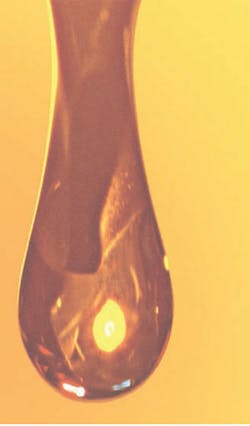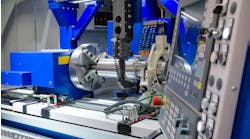Important Considerations for Choosing Hydraulic Fluids
This file type includes high resolution graphics and schematics when applicable.
Demands placed on hydraulic systems constantly change with higher efficiency and speed needs at higher operating temperatures and pressures. Selecting the best hydraulic fluid requires an understanding of each fluid’s characteristics, including thermal stability, hydrolytic stability, low chemical corrosiveness, high anti-wear characteristics, low tendency to cavitate, long life, total water rejection, constant viscosity, regardless of temperature, and low cost.
Although no fluid is ideal, it is possible to select one that is the best compromise for a particular system. This requires knowledge of the system in which a fluid will be used. The designer should know system characteristics such as maximum and minimum operating and ambient temperatures, pumps used, operating pressures and cycle, loads encountered by all components, and control and power valves types.
Influential factors
Each of the following factors influences hydraulic fluid performance:
Viscosity — Maximum and minimum operating temperatures, along with the system’s load, determine the fluid’s viscosity requirements. The fluid must maintain a minimum viscosity at the highest operating temperature. However, it can not be so viscous at low temperature that it cannot be pumped.
Wear — Of all hydraulic system problems, wear is most frequently misunderstood because wear and friction usually are considered together. Friction should be considered apart from wear.
Wear results from metal-to-metal contact. Minimizing metal breakdown through a protective additive is critical. In contrast, friction is reduced by preventing metal-to-metal contact through the use of fluids that create a thin protective oil or additive film between moving metal parts. Excessive wear may not be the fault of the fluid. It may be caused by poor system design.
Anti-wear — Zinc dithio phosphate (ZDP) is common in hydraulic fluids but ashless anti-wear fluids are being used where the metal content in any wastewater from manufacturing processes must be minimized. No ZDP or other type heavy metals have been used in the formulation of ashless anti-wear fluids.
Different style pumps need different protection. Vane and gear pumps need anti-wear protection. Rust and oxidation (R & O) protection is more important in piston pumps because pistons ride on an oil film. When two or more types of pumps are used in a system, it is necessary to pick a common fluid that fulfills the needs of all pump types.
Foaming — When foam is carried by a fluid, it degrades system performance so needs to be eliminated. It can be prevented by eliminating air leaks within the system but two general types of foam still occur frequently — surface foam (which usually collects on the fluid surface in a reservoir), and entrained air.
Surface foam is easy to eliminate via defoaming additives or by designing the system so it dissipates in the reservoir. Entrained air can cause more serious problems because it is drawn into the system. It can cause cavitation, a hammering action that can destroy parts. It is often prevented by properly selecting additive and base oils. However, high-concentration anti-foam agents can increase entrained air.
Fluid viscosity also influences foaming because the more viscous a fluid, the longer it can take for air bubbles to migrate through the fluid and escape.
R & O — Most fluids need R & O inhibitors, which protect the metal and contain anti-oxidation chemicals that help prolong fluid life.
Corrosion — Two potential corrosion problems exist: system rusting and acidic chemical corrosion. System rusting occurs when water carried by the fluid attacks ferrous metal parts. Most fluids contain rust inhibitors to protect against this. To protect against chemical corrosion, additives that offer stability in the presence of water to prevent breakdown and acidic attack on system metals should be considered.
Oxidation and thermal stability — Over time, fluids oxidize and form acids, sludge, and varnish, which can damage system parts, like soft metals. Extended high-temperature operation and thermal cycling worsen the formation of fluid decomposition products. System design should minimize these thermal problems, and the fluid should have additives that exhibit good thermal stability, inhibit oxidation, and neutralize acids.
Water retention — Large amounts of water in hydraulic oil can be removed by regularly draining the reservoir. Small amounts of water can become entrained, especially if the reservoir is small. Demulsifiers are often added to the fluid to speed the separation of water. Filters can remove any remaining water from the hydraulic oil. Water should leave the oil without taking fluid or additives with it.
Temperature — System operating temperature varies, with the suggested maximum generally being 150°F. Temperatures of 180° to 200°F are practical, but fluid will have to be changed more often. Systems can operate up to 250°F, but this can cause rapid decomposition of the fluid and its additives.
Fluid makeup
Most fluids are evaluated based on their ratings for rust and oxidation (R & O), thermal stability, and wear protection, plus other characteristics that must be considered for efficient operation:
Seal compatibility — In most systems, seals are selected so the hydraulic fluid will not change their size or shape, ensuring tight fits. The fluid selected should be checked to ensure that the fluid and seal materials are compatible.
Fluid life, disposability — Two important considerations don’t directly relate to fluid performance in the hydraulic system but have a great influence on total cost: fluid life and disposability.
Fluids that have long operating lives bring added savings through reduced maintenance and replacement costs. Part life should also be longer with higher-quality, longer-life fluid. Longer fluid life also reduces disposal problems.
Demand for environmentally friendly and non-toxic fluids increases disposability issues. Review local environmental laws to determine potential problems.
Synthetic hydraulic fluids contain no waxes that congeal at low temperatures nor compounds that oxidize at high temperatures, which is inevitable in natural mineral oils. Synthetic fluids are used for applications with very low, very high, or a wide range of temperatures.
This article appeared in print as "Hydraulic fluids: the lifeblood of any system," in the May 2011 issue of Hydraulics & Pneumatics magazine.
Click here to view an in-depth tutorial article on hydraulic fluids from our Fluid Power Handbook & Directory. The article covers basic terminology, fire resistance, environmental issues, and more.
More than a dozen hydraulic fluids are described in the box below, which includes links to each supplier's website.
|
Environmentally-friendly oils Green A/W Oils anti-wear hydraulic oils are for use in high-pressure pumps and gears in environmentally sensitive areas. They are aromatic-free, inherently biodegradable and will pass the U.S. Coast Guard static sheen test. They are nontoxic to aquatic life. They offer high thermal and oxidative stability, exceeding 15,000 hr D 943 TOST Life. Four grades — 22, 32, 46, and 68 — have viscosity indexes of 110, 106, 104, and 102, respectively. Clarion Lubricants, (800) 249-4684, bit.ly/HP511ClarionFluid Fire-resistant fluid Cosmolubric B-230 is a vegetable oil-derived fluid formulated with additives to enhance corrosion protection, metal passivation and oxidative inhibition. It is preferred over mineral oil-based fluids because it resists ignition and is less flammable in the event of a hydraulic line rupture. It is readily biodegradable, approved by Factory Mutual as a less hazardous fluid, and listed as BioPreferred by the USDA. Houghton International Inc., (610) 666-4000, bit.ly/HP511HoughtonFluid Multigrade oil DuraClean ISO 46, all-season premium hydraulic oil features an additive chemistry that keeps deposits from settling on components, thus maximizing oil life and providing anti-wear protection. It allows for rapid air release and water separation, and provides high shear stability. Acrylate anti-foam agent contains no silicones, which can lead to inaccurate particle counts. It has a viscosity index of 141. Parker Hannifin, Hydraulic Filter Div., (419) 644-4311, bit.ly/HP511ParkerFluid Food-grade oils Food-grade synthetic hydraulic oils are blended from premium polyalphaolefin (PAO) base oils with additives for the food industry. They are NSF H1 registered and are multi-purpose oils for use in industrial applications as well as hydraulic systems. Two grades — 46 and 68 — have viscosity indexes of 127 and 141, respectively. They reduce varnish and deposit build-up and offer a low evaporation rate while operating in a wide temperature range. CRC Industries, (800) 272-4620, bit.ly/HP511CRCFluid Biodegradable fluids EnviroLogic 3000 series hydraulic fluids are high performance, readily biodegradable, and non-hazardous. They are intended for severe service, extreme temperatures ranging from –40° to 400°F, and high pressures. They are formulated from non-toxic base stocks that offer high oxidation and thermal properties, providing enhanced wear protection, cleanliness and long life. Four grades — 32, 46, 68, and 100 — have viscosity indexes of 190, 178, 176, and 174, respectively. Terresolve, (440) 951-8633, bit.ly/HP511TerresolveFluid Energy-efficient oils DTE 10 Excel series lubricants are shear stable, high-viscosity-index fluids with a zinc-free, anti-wear system for use in modern, high-pressure industrial and mobile equipment hydraulic systems. They can keep systems cleaner, longer and improve energy efficiency, extend oil and equipment life, and reduce operational costs. Mobil Industrial Lubricants, (800) 662-4525, bit.ly/HP511MobilFluid Anti-wear oil Super Hydraulic Oil 46 is a premium antiwear hydraulic oil with a very high viscosity index for use in all seasons. It provides high anti-wear properties, rust protection, low deposit formation, good demulsibility, oxidation resistance, good anti-foam properties and fast air release properties. It helps reduce vane and gear pump wear and offers a viscosity index of 163. Volvo Construction Equipment, +44 (0) 1223 836636, bit.ly/HP511VolvoFluid Synthetic fluid Dimension hydraulic fluid is an ashless fluid made with synthetic base stocks and additives, offering high resistance to sludge formation, chemical stability, and anti-wear protection. It is designed for use in vane, piston, and gear pumps. Two grades — 46 and 68 — offer viscosity indexes of 131 and 135, respectively. High oxidation stability provides extended drain and filter change intervals. Citgo Petroleum Corp., (800) 248- 4684, bit.ly/HP511CitgoFluid Bio-based fluids Liquid Wrench powered by EnviroLogic Mobile Equipment Hydraulic Fluid is ideal for smaller mobile equipment. It is readily biodegradable and safe for use in ISO 46 grade hydraulic systems. It meets or exceeds most major hydraulic equipment manufacturers’ requirements and performs well in low temperatures. It is available in 1- and 5-gal containers. RSC Bio Solutions, (877) 464-4865, bit.ly/HP511RSCFluid Low-temperature fluid Tellus S4 VX hydraulic fluid for ultra-low temperatures features ashless technology for extended life and wear protection. It operates in temperatures as low as –58°F. It features low toxicity to aquatic life, offers up to 95% less wear than industry standard and limits degradation for longer oil life. Extra-high viscosity index provides consistent, efficient operation and protection from cold startup to normal conditions. Line is currently being redesigned.Shell Lubricants, (800) 237-8645, bit.ly/HP511ShellFluid Synthetic fluid HLP Synth is made with a saturated synthetic ester base and high-quality additive package. It prevents system deposits and gumming and offers high corrosion and wear protection, excellent oxidation and aging stability, and four to five times longer in-service life compared to mineral oil based hydraulic oils. It is highly biodegradable and features low toxicity.Panolin America Inc., High-Tech Lubricants, (805) 676-1193, bit.ly/HP511PanolinSynth Marine oil Marine Hydraulic oil is an inherently biodegradeable, ashless, high performance oil that meets U.S. Fish and Wildlife Department’s and EPA’s toxicity requirements for marine life. Proprietary Synerlec additive technology helps bearings and equipment run smoother, cooler, quieter, longer and more efficiently. ISO grades 15, 22, 32, 46, 68, 100, and 150 have viscosity indexes of 91, 105, 111, 110, 109, 105 , and 105, respectively.Royal Purple Inc., (281) 354-8600, bit.ly/HP511RoyalPurpleMarine Cold-temperature fluid Hydrex MV Arctic hydraulic oil for extremely cold temperatures is an anti-wear oil that offers water separability and hydrolytic stability without loss of performance additives. It provides rust and corrosion protection against water damage and is readily biodegradable. It offers starting temperatures at –46°C, with operating range between –44°C and 23°C and has a viscosity index of 383.Petro-Canada, (416) 730-2408, bit.ly/HP511PetroCanArctic |
The following list contains contact information for more than 30 suppliers of hydraulic fluids.
|
Manufacturers Index: AMSOIL Inc., Superior, WI, (715) 392-7101, www.amsoil.com Anderol Special Lubricants, East Hanover, NJ, (973) 887 7410, www.anderol.com BASF Corp., Mt Olive, NJ, (973) 426-4965, www.basf.com Bioblend Renewable Resources LLC, Joliet, IL, (630) 227-1800, www.bioblend.com Boss Lubricants, Calgary, AB, (403) 279-2223, www.bosslubricants.com C&C Oil Co., Kennesaw, GA, (770)-424-4093, www.ccoilco.com CAM2 International, Evergreen, CO, (800) 338-2262, www.cam2.com Castrol Industrial North America Inc., Naperville, IL, (877) 641 1600, www.castrol.com/industrial Caterpillar Inc., Mossville, IL, (800) 774-7251, www.cat.com Chevron USA, San Francisco, CA, (800) 582-3835, www.chevronlubricants.com Citgo Petroleum Corp., Houston, TX, (800) 248-4684, www.citgolubes.com Clarion Lubricants, Houston, TX, (800) 249-4684, www.clarionlubricants.com CRC Industries, Warminster, PA, (800) 272-4620, www.crcindustries.com Dow Corning Corp., Midland, MI (989) 496-6000, www.dowcorning.com Environmental Lubricant Manufacturing Inc., Grundy Center, IA, (319)824-5203, www.elmusa.com Evonik RohMax USA., Horsham, PA, (215) 706-5801, www.rohmax.com Gelest Inc., Morrisville, PA, (215) 547-1015, www.gelest.com Houghton Int’l Inc., Valley Forge, PA, (610) 666-4000, www.houghtonintl.com Lubrication Engineers Inc., Fort Worth, TX, (817) 916-3200, www.le-inc.com Mobil Industrial Lubricants, (800) 662-4525, www.mobilindustrial.com NOCO Energy Corp., Tonawanda, NY (800) 500-6626, www.noco.com Panolin America Inc., Ventura CA, (805) 676-1193, www.panolin.com/us/ Parker Hannifin, Hydraulic Filter Div., Metamora, OH, (419) 644-4311, www.parker.com/hydraulicfilter Petro-Canada Lubricants, Mississauga, ON, (888) 284-4572 (US), (800)268-5850 (Canada), lubricants.petro-canada.ca Premier Hydraulic Services, Tualatin, OR, (503) 691-2961, www.premierhyd.com Quaker Chemical, Conshohocken, PA, (610) 832-4000, www.quintolubric.com Royal Purple Ltd., Porter, TX, 281-354-8600, www.royal-purple-industrial.com RSC Bio Solutions, Indian Trail, NC, (877) 464-4865, www.rscbio.com Schaeffer Mfg. Co., St. Louis, MO, (314)865-4100, www.schaefferoil.com Shell Lubricants, Houston, TX (800) 782-7852, www.shell-lubricants.com Terresolve, Mentor, OH, (440) 951-8633, www.terresolve.com Texaco Lubricants, Houston, TX, (713) 752-3091, www.texacolubricants.com Union Carbide Corp., Danbury, CT, (713) 849-7000, www.unioncarbide.com Vektek Inc., Emporia, KS, (800) 992-0236, www.vektek.com Volvo Construction Equipment, Cambridge, England, +44 (0) 1223 836636, www.volvo.com |
This file type includes high resolution graphics and schematics when applicable.



